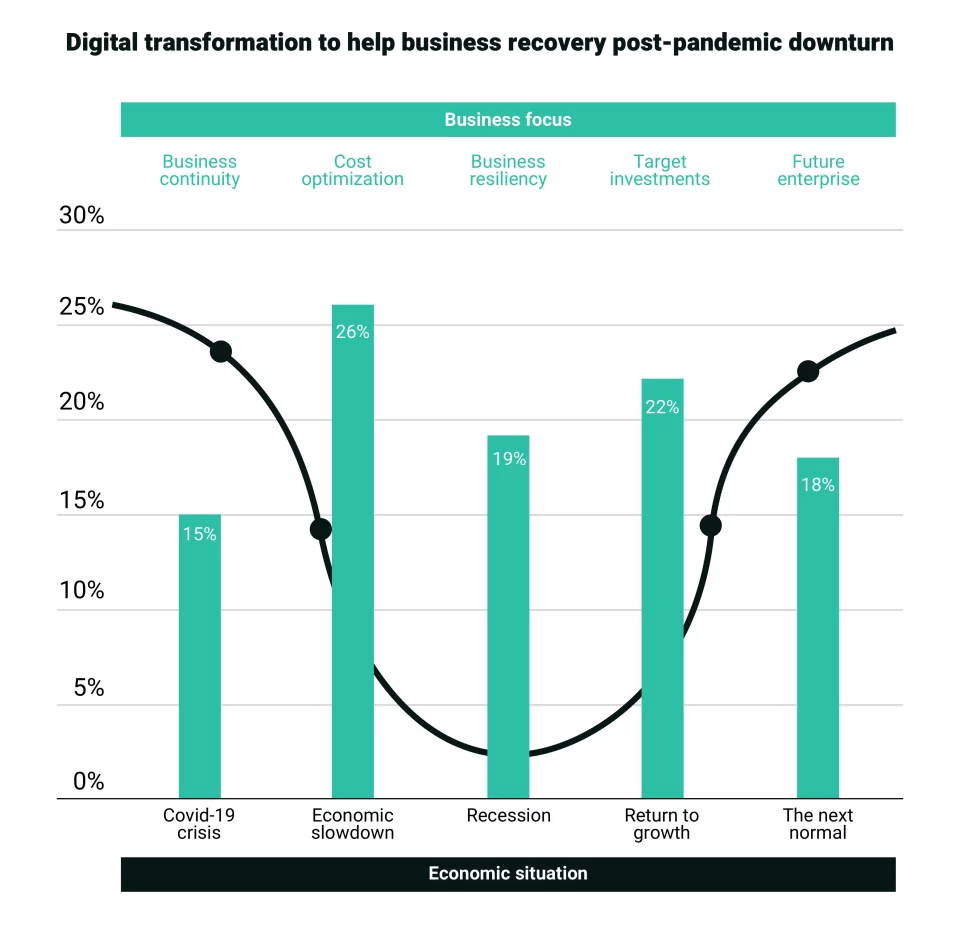INTRODUCTION
The need to deliver superior patient care is behind digital transformation in healthcare
Digital transformation has pervaded almost every facet of our lives. This monumental transformation occurs at the confluence of two explosive trends: the rise of internet-based computing applications and the expansive construction of high-speed digital infrastructure.
With a projected market value of $11.9 trillion by 2022, the global healthcare industry is one of the biggest beneficiaries of digital transformation. The sector comprises various institutions, from hospitals, clinics, and assisted living facilities to healthcare insurance companies and pharmaceuticals. By market breakdown, healthcare services remain in the lead as the top-performing segment, with nearly $2.9 trillion in global annual sales.
The voracious uptake of digital technologies in medical practices has been spurred by the demand for prompt and precise patient care over the years. According to research,nine out of 10 US patients opt for healthcare providers who prioritize ease of care access, patient privacy, data security, and individualized care.
DRIVERS
The pandemic acted as a strong catalyst for virtual care to gain traction
Adoption of digital applications in the healthcare sector has been slow compared to retail and consumer goods. Exorbitant costs, low returns, and nascent healthcare technologies leading to poor usability have all acted as the key barriers preventing healthcare incumbents from making the switch—that is, until the COVID-19 crisis struck.
With social distancing protocols in full swing, the pandemic’s cataclysmic fallout has propelled the need for virtual care at a record-breaking pace. Digital health startups reportedly accrued $21.3 billion in investments within the first nine months of last year alone—a nearly 46% jump from 2020.
Despite the pre-emptive measures taken to reduce viral transmissions, the surging cases strain the healthcare system enormously. As a result, many providers have turned to custom healthcare software development to digitize operations with new capabilities.
Telehealth
Telehealth involves using digital communication technologies, like mobile phones and computers, to access seamless virtual care. It encompasses a variety of long-distance services, such as remote patient monitoring, video-based checkups, and online prescription refills. Like most e-commerce applications, a telehealth software program typically requires multi-platform integrations on a cloud server—tailoring different features and access points to suit the needs of patients and practitioners separately.
Telehealth provides an excellent urgent care alternative to low acuity and chronic patients since it eliminates unnecessary hospital trips. Interestingly, the demand for virtual care has stabilized since its peak at the start of the pandemic, albeit at 38 times higher than pre-pandemic levels.
Database software
Moving away from a paper-based filing system to a digital database enables healthcare providers to securely store enormous troves of patient information without worrying about space constraints. Electronic medical records (EMR) and electronic health records (EHR) are the most common medical databases.
These electronic records are locked with airtight authorization levels—granting access and purview only to trusted parties, such as the patients themselves (upon request) and their trusted physicians. This ensures that only authorized personnel can review and process confidential information for the intended purposes.
Healthcare data analytics
The recent advancements in clinical trials, care coordination, and research development have been made possible by leveraging data-driven technologies on an enterprise scale. While simplifying the collection and arrangement of medical data is critical for management efficiency, healthcare organizations can take this further by employing automated tools to identify actionable insights across various data points.
Medical practitioners can utilize artificial intelligence and machine learning capabilities to analyze massive data and leverage t time-sensitive clinical assessments to improve patient outcomes with robust diagnostics.
Smart medical devices
Although medical monitoring has been around for more than a century, it wasn’t until the dawn of the Internet of Things (IoT) that its implication in clinical data aggregation and communication gained significant traction. As a complex juxtaposition between AI, sensor technology, and wireless connectivity, medical IoT devices can coordinate in an interdependent data ecosystem to help practitioners monitor at-risk patients in real-time.
The prevalence of big data plays a pivotal role in bringing highly personalized healthcare solutions to patients. Custom IoT applications, such as medical wearables, remote health monitors, and cutting-edge medical imaging equipment, have become possible thanks to the automated collection and extrapolation of vast amounts of information across device touchpoints.
Healthcare interoperability
The recent uptick in telemedicine and other virtual care has shed light on the dearth of interoperability within the US health sector. Despite the longstanding presence of federal data-sharing mandates, the complexity of health data creates an industry paradox where medical providers must strike a delicate balance between safeguarding data privacy and exchanging critical information to deliver holistic medical needs.
To build an EHR platform that satisfies those prerequisites, healthcare organizations must develop an application framework that thoroughly supports seamless data-sharing activities while fully complying with HIPAA and other privacy laws.
Inventory and asset management
Keeping track of medical equipment and supplies in times of crisis is incredibly difficult, especially if the medical facilities see an unprecedented demand increase. That is why having an inventory and asset management program at your disposal is critical in monitoring the availability and status of all your existing assets—be they in use, idle, or experiencing downtime.
Moreover, integrating such an application into your current system lets you meet the rising demands for urgent care, streamline the patient intake process, and devise a more efficient future workflow based on past usage trends.
Business process management
Like other organizations, medical providers require assistive management capabilities to perform various non-medical functions—from supply procurement and staff management to insurance claims processing and billing.
As the name suggests, business process management aims to enhance organizational efficiency by automating low-value and iterative tasks, establishing close communication with key stakeholders, and generating intuitive and scalable workflows to suit your changing goals.
BENEFITS
Key advantages of custom software development in healthcare
Building a software application instead of purchasing an off-the-shelf product has several benefits: enhanced scalability, better integration, competitive value offering, and more substantial investment returns.
However, at a sectoral level, a custom program introduces more than just strategic gains to your current processes. It also seeks to imprint your corporate DNA with a transformative change—taking your clinical workflow to new heights with several structural advantages.
Timely quality care
Integrating digital technologies in medical care—from telemedicine to IoT-powered wearables—has facilitated the timely delivery of more personalized healthcare services to a broader range of recipients.
Easy accessibility across integrated platforms
A highly accessible and intuitive custom healthcare software must be supported with a navigable user interface and comprehensive features so that every relevant party can utilize it fully to accomplish their goals regardless of their tech proficiencies.
Better data security
Data privacy and security are the cornerstones of every well-executed digital application. As such, migrating confidential information from paper-based documentation into an encrypted digital portal is a great exercise to ensure that your standard operations are always compliant with the incumbent data laws and regulations.
Increased outreach and opportunities
With a custom solution, you can identify new market opportunities to expand your outreach, adapt to changing needs immediately by leveraging new digital capabilities, and always remain at the forefront of medical advancements and innovation. These strategic benefits, in turn, empower you to deliver quality healthcare services to your patients and reinforce your reputation as a thought leader in the industry.
ADOPTION
Custom software solutions improve diagnostic accuracy and cross-functional communication
One of the most innovative benefits of adopting custom healthcare technology is the opportunity to improve all aspects of data analysis and enterprise-wide communication dramatically. Unlock the true enterprise value of data with digital healthcare products that enhance diagnostic accuracy and clinical efficiency to deliver a quality culture of continuous improvement.
Tomorrow’s interoperable data-driven medical services are fueled by data governance frameworks that deliver flows of information across your organization more seamlessly. As your organization accelerates digital transformation, every division of your operation will benefit from cross-functional business intelligence insights and the opportunity to work with qualitative and quantitative data, guiding your success profoundly.
Invest in delivering the most advanced custom healthcare technology solutions to secure a competitive advantage and continue to innovate. Instead of trying to adapt your processes to an off-the-shelf solution, deliver the functionality and user experience your end-users need to transform your services at scale.
CONCLUSION
Final thoughts on business imperatives that push digital transformation
While the demand for digitalization in healthcare has exponentially grown in the past few years, external disruptions have ultimately become the primary push for more technological adoption in the industry. This is evident as the devastating impact of COVID-19 remains the most significant catalyst for digital uptake among healthcare organizations and practitioners.
Several technology trends like telehealth, medical wearables, and asset management software have recently gained prominence among healthcare workers in delivering highly personalized care against the global health crisis.

Custom software has the potential to accelerate digital transformation and rejuvenate business Source
Are you thinking of fortifying your healthcare operations with custom software development? Let us know about your business requirements, and receive a complimentary consultation session to get started.
Invest in delivering the most advanced custom healthcare technology to secure competitive advantage and innovate. Instead of trying to adapt your processes to an off-the-shelf solution, provide the functionality and user experience your end-users need to transform your services at scale.






